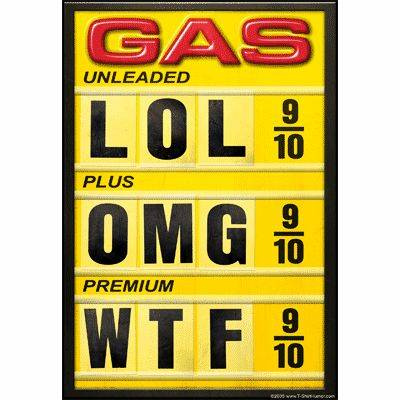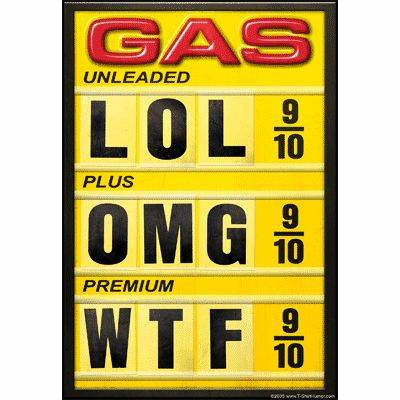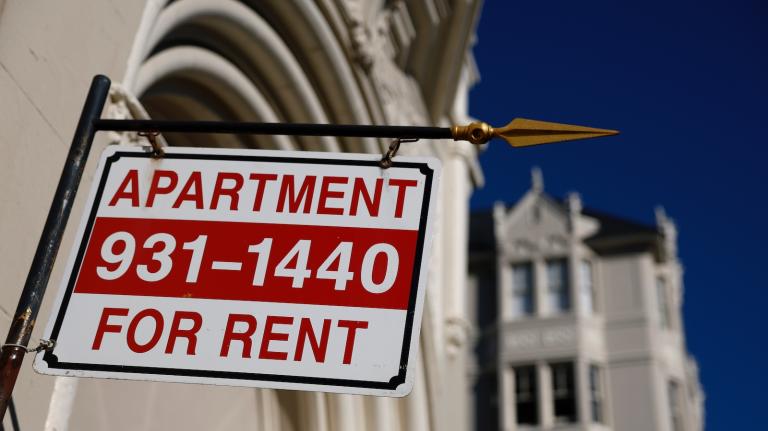 Photo: A SiegelEuropeans want to know: “Why are Americans so angry about petrol prices?“
Photo: A SiegelEuropeans want to know: “Why are Americans so angry about petrol prices?“
An article on the BBC earlier this week looks at the question from a very high-minded, almost anthropological perspective. You can almost see the reporter screwing in his monocle to observe the colonists’ colorful ways.
Aside from a few man-in-the-parking-lot interviews in Tysons Corner, Va., insight into the perplexing American point of view is left to an “expert” — The Wall Street Journal‘s automotive critic, Dan Neil, who took the grand historical view:
“Anger is probably more tied up with a wider sense of decline and also a loss of privilege,” [says Neil.]
“Cheap gas has been one of the prerogatives of the American Empire so people have become accustomed to it in a way which is somehow associated with our ability to wield our will around the world.
“We’re mad because we’ve spent a lot of money in the Middle East and made a lot of enemies and defended a lot of tyrants and still gas prices go up.”
And knowing that the British pay double won’t make Americans feel any better, he adds.
“Americans are not aware of what the rest of the world pays for gas. We are a very big, inward-looking domestic market. We don’t watch soccer, we don’t watch French movies and we don’t really care what the Europeans pay for their gas.
“It’s a very big country and the entire infrastructure is predicated on scandalously cheap energy. Everything we do is big — business, agriculture, entertainment.
“Where we live, where we play, all of that is predicated on cheap gas, so when the price of gas goes up, it really cuts to the heart of the American way of life.”
Neil (whom I have called out before for his ridiculous attitudes toward pedestrians) makes some good points. But many of the 450 comments on the article paint a less theoretical picture: Americans are mad because they live in places where automobiles are the only feasible means of transportation. The economy is terrible. When gas prices go up, they find themselves even closer to the economic brink. Throw in anger at tax breaks for oil corporations, and you have a very pissed-off group of people.
Again and again, the commenters talk about not having any choice, about living in places that are not amenable to public transportation, or where such transportation is unreliable or nonexistent.
Neil touched briefly on this problem in his analysis:
The long-term solutions, [Neil] says, would involve a huge investment in rail, an overhaul of the infrastructure and a change in mindset — not events that happen overnight.
But saying that something won’t “happen overnight” is very different from saying that it can’t happen at all. For generations, we have continued to build our communities in a way that makes car dependence ever more necessary, instead of making it easier to do without a car. The question is, when will we start to plan differently? Until we address land-use patterns and subsidies that encourage sprawl, and give Americans more choices about how they get around and how far they have to go for work, we are likely to continue getting madder and madder when we go to the pump. And our economy will continue to deteriorate. That whole “American Empire” thing? Yeah, you can forget about it.
So what can we do? Well, we can’t keep throwing away our used suburbs like so much tissue paper any longer, for one thing. Instead of building farther and farther reaches of sprawl, we need to start reimagining the communities we have already built.
In a recent article on New Urban Network, Galina Tachieva — author of The Sprawl Repair Manual — says fixing our suburban problem isn’t an option anymore, it’s a necessity:
I would say that suburban retrofitting will not be about architecture at all; it will be about economic survival. Entering a post-recession decade, obviously without fanfare, we will need not only to repair the physical fabric of sprawl but also to generate a new economic framework.
It’s an effort that is actively underway in Canada, a nation that shares many geographic and demographic characteristics with the United States. This from The Toronto Globe and Mail:
As Canada’s growing metropolitan regions continue to absorb tens of thousands of new people every year, mayors and planners in the largest suburbs — those that would be listed as major Canadian cities if they weren’t classified as satellites — are figuring out how to transform their one-time bedroom communities into independent urban centres.
As the Globe and Mail article makes clear, no one really knows how to do this successfully — yet. But we’re going to have to figure it out. Because as we’ve seen again and again, simply shaking our collective fist at the gas pump isn’t very productive.



